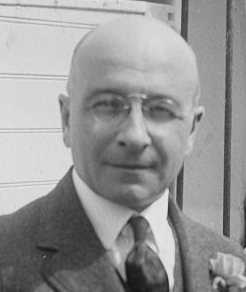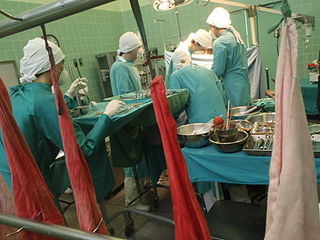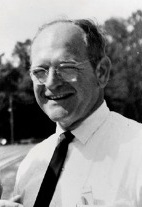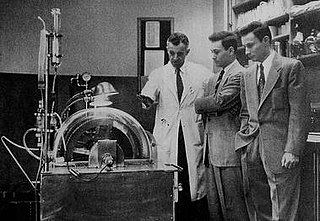Related Research Articles

Alexis Carrel was a French surgeon and biologist who spent most of his scientific career in the United States. He was awarded the Nobel Prize in Physiology or Medicine in 1912 for pioneering vascular suturing techniques. He invented the first perfusion pump with Charles Lindbergh opening the way to organ transplantation. Carrel was also a pioneer in tissue culture, transplantology and thoracic surgery. He is known for his leading role in implementing eugenic policies in Vichy France.
Nephrology is a specialty for both adult internal medicine and pediatric medicine that concerns the study of the kidneys, specifically normal kidney function and kidney disease, the preservation of kidney health, and the treatment of kidney disease, from diet and medication to renal replacement therapy. The word "renal" is an adjective meaning "relating to the kidneys", and its roots are French or late Latin. Whereas according to some opinions, "renal" and "nephro" should be replaced with "kidney" in scientific writings such as "kidney medicine" or "kidney replacement therapy", other experts have advocated preserving the use of renal and nephro as appropriate including in "nephrology" and "renal replacement therapy", respectively.

Organ donation is the process when a person authorizes an organ of their own to be removed and transplanted to another person, legally, either by consent while the donor is alive, through a legal authorization for deceased donation made prior to death, or for deceased donations through the authorization by the legal next of kin.

Organ transplantation is a medical procedure in which an organ is removed from one body and placed in the body of a recipient, to replace a damaged or missing organ. The donor and recipient may be at the same location, or organs may be transported from a donor site to another location. Organs and/or tissues that are transplanted within the same person's body are called autografts. Transplants that are recently performed between two subjects of the same species are called allografts. Allografts can either be from a living or cadaveric source.
Cryobiology is the branch of biology that studies the effects of low temperatures on living things within Earth's cryosphere or in science. The word cryobiology is derived from the Greek words κρῧος [kryos], "cold", βίος [bios], "life", and λόγος [logos], "word". In practice, cryobiology is the study of biological material or systems at temperatures below normal. Materials or systems studied may include proteins, cells, tissues, organs, or whole organisms. Temperatures may range from moderately hypothermic conditions to cryogenic temperatures.

Gatorade is an American brand of sports-themed beverage and food products, built around its signature line of sports drinks. The drink is manufactured by PepsiCo and is distributed in over 80 countries. The beverage was developed in 1965 by a team of researchers led by Robert Cade. It was originally made for the Gators at the University of Florida to replenish the carbohydrates that the school's student-athletes burned and the combination of water and electrolytes that they lost in sweat during vigorous sports activities.

James Robert Cade was an American physician, university professor, research scientist and inventor. Cade, a native of Texas, earned his bachelor and medical degrees at the University of Texas, and became a professor of medicine and nephrology at the University of Florida. Although Cade engaged in many areas of medical research, he is most widely remembered as the leader of the research team that created the sports drink Gatorade. Gatorade would have significant medical applications for treating dehydration in patients, and has generated over $150 million in royalties for the university.

Transplant rejection occurs when transplanted tissue is rejected by the recipient's immune system, which destroys the transplanted tissue. Transplant rejection can be lessened by determining the molecular similitude between donor and recipient and by use of immunosuppressant drugs after transplant.
The National Kidney Foundation, Inc. (NKF) is a voluntary nonprofit health organization in the United States, headquartered in New York City, with over 30 local offices across the country. Its mission is to prevent kidney and urinary tract diseases, improve the health and well-being of individuals and families affected by these diseases, and increase the availability of all organs for transplantation. NKF is the largest, most comprehensive, and longstanding patient-centric organization dedicated to the awareness, preventions and treatments of kidney disease in the United States.

Samuel Ray Graves was an American professional football player and college football coach. He was a native of Tennessee and a graduate of the University of Tennessee, where he was the starting center and team captain for the Volunteers under head coach Robert Neyland. After playing in the National Football League (NFL) for three seasons, he returned to Tennessee to serve as an assistant football coach, then left for a longer stint as an assistant at Georgia Tech under head coach Bobby Dodd. He was the head football coach at the University of Florida from 1960 until 1969, where he led the Gators to their most successful decade in program history up to that point. While at Florida, he recruited and coached Heisman Trophy-winning quarterback Steve Spurrier, who often praised Graves as a role model and mentor during his own successful coaching career. Graves also served as Florida's athletic director from 1960 until his retirement in 1979.

Anthony Atala is an American bioengineer, urologist, and pediatric surgeon. He is the W.H. Boyce professor of urology, the founding director of the Wake Forest Institute for Regenerative Medicine, and the chair of the Department of Urology at Wake Forest School of Medicine in North Carolina. His work focuses on the science of regenerative medicine: "a practice that aims to refurbish diseased or damaged tissue using the body's own healthy cells".

The University of Alberta Hospital (UAH) is a research and teaching hospital in Edmonton, Alberta, Canada. The hospital is affiliated with the University of Alberta and run by Alberta Health Services, the health authority for Alberta. It is one of Canada's leading health sciences centres, providing a comprehensive range of diagnostic and treatment services to inpatients and outpatients. The UAH treats over 700,000 patients annually.

Paul Ichiro Terasaki was an American scientist in the field of human organ transplant technology, and professor emeritus of surgery at UCLA School of Medicine.
Dialysis Clinic, Inc. is a nonprofit medical corporation founded in 1971 and chartered as a 501(c)(3) tax-exempt organization under IRS regulations.

John Putnam Merrill was an American physician and medical researcher. He led the team which performed the world's first successful kidney transplant. He generally credited as the "father of nephrology" or "the founder of nephrology," which is the scientific study of the kidney and its diseases.

The Samuel Proctor Oral History Program (SPOHP) is the official oral history program at the University of Florida. With over 6,500 interviews and more than 150,000 pages of transcribed material, it is one of the premier oral history programs in the United States. SPOHP's mission is "to gather, preserve, and promote living histories of individuals from all walks of life." The program involves staff, undergraduate and graduate students, and community volunteers in its operation.
Calvin Ralph Stiller is a Canadian physician, scientist, and entrepreneur. He retired as a member of the Schulich School of Medicine & Dentistry at Western University in London, Ontario.
Regeneration in humans is the regrowth of lost tissues or organs in response to injury. This is in contrast to wound healing, or partial regeneration, which involves closing up the injury site with some gradation of scar tissue. Some tissues such as skin, the vas deferens, and large organs including the liver can regrow quite readily, while others have been thought to have little or no capacity for regeneration following an injury.

Edward Dewayne Douglas was an American football offensive tackle who played one season with the New York Giants of the National Football League (NFL). He was drafted by the New York Giants in the fourth round of the 1953 NFL draft. He played college football for the University of Florida and attended Kissimmee High School in Kissimmee, Florida.
References
- 1 2 3 John Walters (July 2, 2001). "The Gatorade Guys". SportsIllustrated.com. Archived from the original on August 27, 2011.
- ↑ "LifeLink Mission Statement |" . Retrieved August 2, 2012.
- ↑ "Interview with Dana Leroy Shires, Jr". Interviewed by Julian Pleasants. University of Florida George A. Smathers Libraries. December 18, 2001.
- ↑ "Dr. James Robert Cade- Gatorade inventor". University of Florida College of Medicine. Retrieved August 5, 2012.
- ↑ "Interview with Dana Leroy Shires, Jr". Interviewed by Julian Pleasants. University of Florida George A. Smathers Libraries. December 18, 2001. p. 13.
- 1 2 3 Neil Amdur (December 2, 2007). "Raise a Glass to the Father of Energy Drinks". The New York Times.
- ↑ "LifeLink Mission Statement |accessdate=August 2, 2012". ea
- ↑ Adam Swift. "LifeLink Tissue Bank". Inside Healthcare Magazine. Retrieved August 5, 2012. ea
- ↑ Vicki Collins Edwards (October 2006). "Home On the Colorado Range" (PDF). Scottsdale Magazine.